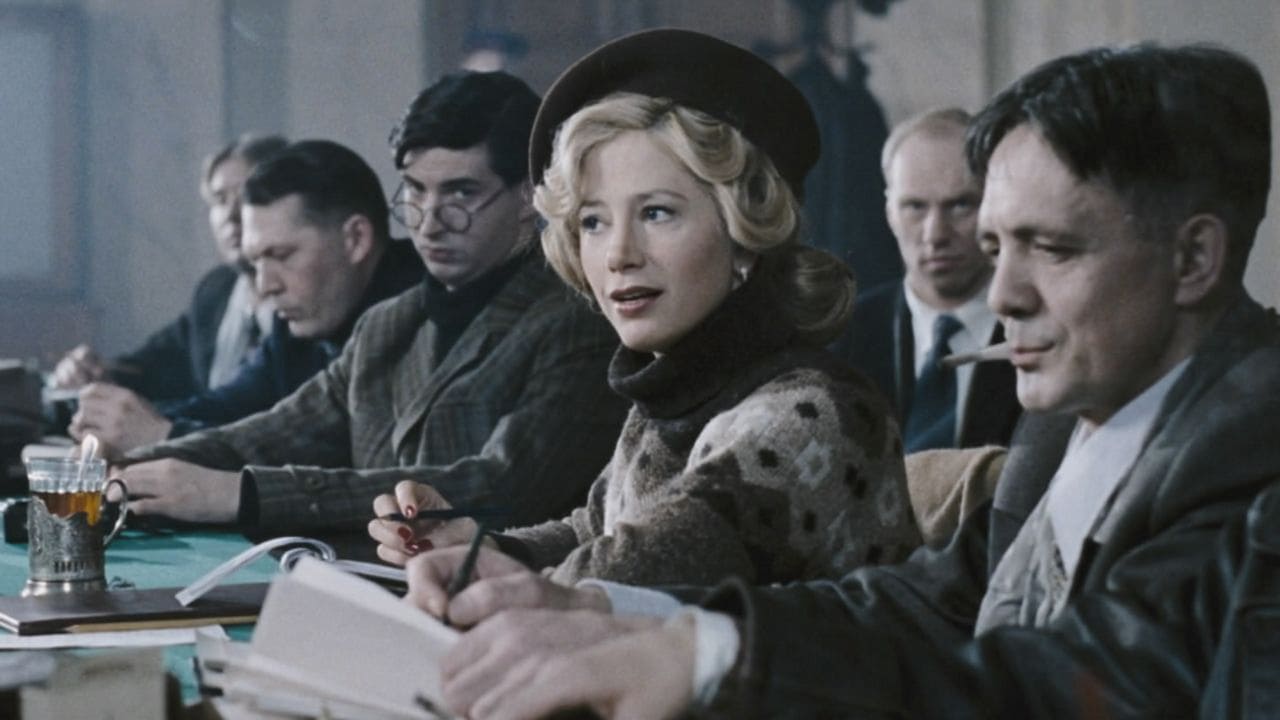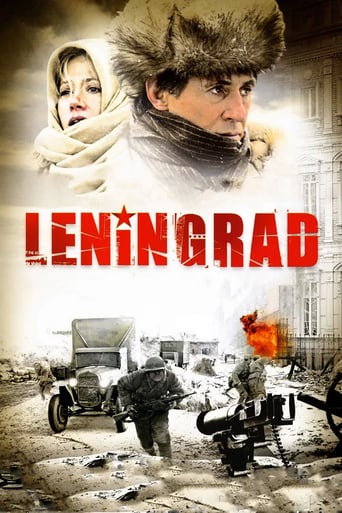Inclubabu
Plot so thin, it passes unnoticed.
Ava-Grace Willis
Story: It's very simple but honestly that is fine.
Marva-nova
Amazing worth wacthing. So good. Biased but well made with many good points.
Brenda
The plot isn't so bad, but the pace of storytelling is too slow which makes people bored. Certain moments are so obvious and unnecessary for the main plot. I would've fast-forwarded those moments if it was an online streaming. The ending looks like implying a sequel, not sure if this movie will get one
paul2471
Found outstanding performance by Olga Sutulova as "Nina Tsvetkova" Mira Katherine Sorvino as "Kate Davies" excellent also.They depict well the determination and commitment essential for success, as true reminders how so many of us enable far smaller barriers to overcome us.Entire video each time leaves me with great sadness and sympathy for citizens of then Leningrad, for their suffering and sacrifice endured, while at same time great thanks to them for the meaning now attached to the word Leningrad, as a reminder of true endurance.The word Leningrad, or memory at other memorials, always for a moment generates sadness, then thanks to them for their example of real endurance, real suffering, of real struggle when facing adversity.They a reminder and encouragement to us all to show determination as we face lesser challenges...
davidcartiersr2003
What a disappointment .... This SHOULD have been a great film, with such a topic, it should have been a great epic. Instead , we get a rather formulaic and simple minded romance story, so devoid of feeling for the historical complexity of this vast tragedy, that it comes across as an insult to the memory of all those millions who suffered and died here. The story of a stranded British war correspondent (Sorvino) and her lover (Byrne), which apparently is based on true events, would have worked as a subtext; a sideline to the larger human events transpiring, but, Hollywood-style, it takes front and centre, while the Russian People are largely relegated to roles as stereotyped KGB bad guys or masses of faceless ragamuffins dragging coffin-laden sledges along windy alleyways. None of the great players are fleshed out in this mess ... Zhdanov, whose heroic efforts saved so many, is shown only in passing, while Stalin, whose bad decisions led to the siege of Leningrad, is not even mentioned.Sorvino, who, even when looking withered and starved, still has the cutest smiles in film history, tries desperately to bring some life to this, but is defeated by her desperate attempt to affect a British accent, amid the generally poor direction. The other big-name actors don't even try, as they are handed only bit parts.After this, and "The Barber of Siberia", I'm coming to the conclusion that any Russian film with western actors should be avoided like the plague. A Pity. If you want to see a great Russian film about WW2, see Tarkovski's early film, "The Childhood of Ivan", or Elem Klimov's "Come and See". If you want to know something about the siege of Leningrad read Harrison Salisbury's harrowing epic, "The 900 Days". The movie's not a total bomb, It may be worth watching if you're a Russian film buff like myself, or might be enjoyable, if you know nothing about the siege of Leningrad ... It's just an immense disappointment, compared to what it should have been.
max-vernon
To make an interesting historical drama without trashing history is quite a challenge. This film succeeds admirably. By focusing on the lives of a few fictitious (?) characters, we are able to experience slow starvation in a bitterly cold Russian winter, feel how it affects both body and mind and see how this leads desperate people to do desperate things.One and a half million Russians died in the Leningrad siege which lasted nearly 900 days. The film was wise to focus on the first winter only. The historical background is shown accurately. The negatives: a city under constant German bombardment from land and air; reducing daily calorie intake as food supplies dwindle, cannibalism, slicing flesh from a still-living horse; criminal elements encouraged by a black market in food; civilians kept in check by a ruthless Soviet police system and, especially, an immeasurable (because punishable) wish on the part of the populace to surrender to the Germans - 'at least they will feed us.' The positives: the winter lifeline offered by a frozen Lake Ladoga, supplies of American bacon and lard, individuals supporting each other.This is a very honest film from a Russian director who treads a careful path between paying homage to Russian suffering on the one hand and being truthful about the Communist system on the other. A Soviet director would have had to make a very different film indeed. Fear of the NKVD secret police and its own paranoia about internal and external subversion are central to the story line. The Soviet system was unforgiving of failures and mistakes and this affected how individual Russians thought and behaved.Director Buravsky says his film is an 'independent' one. It is certainly less commercial than 'Admiral' (2008) which relies on a romantic story line and set-piece battles to capture audience attention. The action scenes in 'Leningrad' are kept to a minimum but are sufficient to remind us that the city suffered unpredictable and spasmodic bombardment. It is much the better film of the two.'Leningrad' is held together by the supportive relationships which develop between the main characters. It is, after all, a film more about civilian suffering than about a military campaign. Characterisation is fairly good. Our young teacher-turned policewoman heroine is quite willing to shoot any shirkers: her Komsomol years have channelled youthful idealism into ruthless Communist action. And yet she helps a stranded British journalist with whom she can practise her English. She develops an affinity with this exotic educated woman. Olga Sutulova and Mira Sorvino give convincing performances as the female leads who become comrades rather than gushing friends. Given the 'we will all probably die' circumstances, the film avoids over-emotionalism and sentimentality. However, the Kate Davis character would not have forgotten her native Russian at the age of 10.Involving foreigners in the plot allows the film to escape siege claustrophobia and is more likely to appeal to a wider audience than an all-Russian affair. Rainy Eastbourne offers a pleasant break from frozen Leningrad. On the other hand, it could also be a commercial ploy to allow greater penetration of world markets (as the capitalists would say)!Given the grim situation, offsetting the film's rising dramatic tension with comic relief is not really an option. Instead the director gives us short action scenes and scenes from the German and Russian HQs. These explain the military background. They also contrast the plight of the Leningraders with the elites running each side of the war from comfort and safety. The film appears to show the German leadership in a more favourable light than the Soviet one. Buravsky gives the German commander Ritter von Leeb a pilot-nephew who pricks his uncle's conscience about the fate of the Leningraders. Did this catholic Field Marshall really have a nephew with a death wish named Walter Hoesdorff who was shot down whilst attacking a Russian AA battery over Leningrad? This is where historical films have to be careful. If no such nephew existed, he should not have been invented. On the other hand, showing empathy for enemy sensibilities should be applauded. No matter how much armies and combat conspire to homogenise men, individual soldiers retain their individuality.Zhdanov, the city's ruthless defender, is shown unsympathetically; he has a much smaller role than the Germans. A photo of the dreaded Beria hangs on a wall in the Moscow HQ of the NKVD where fighting subversion assumes a higher priority than fighting Germans. Buravsky's 'extras' interview reveals his belief that Stalin hated Leningraders for being too independently-minded. He thinks that Stalin could have done more to relieve the city earlier. It suited the Great Leader to see Leningraders die?!!! 27 million dead was certainly a high price to pay for beating the Germans in 'The Great Patriotic War'. Russians no doubt debate how many of these deaths should be blamed on Stalin. This film will not find favour with those Russians wishing to revive the Stalin Cult as a means to restoring Russia's sense of her former greatness. Stalin does not appear in the flesh in this film but Hitler does.In this respect 'Leningrad' offers a useful snapshot of Russia's present-day relationship with her Soviet past. Pity about the subtitles. That black space underneath the film is the obvious place for them. Why can't this be standardised across the industry?
lagordon64
A highly emotional, deeply moving and beautifully told story of one of the greatest tragedies of the 20th century. It absolutely cannot leave you indifferent. While it depicts horrific events during the siege of Leningrad it manages to keep a shred of hope and faith (in human nature first and foremost) by creating these most humane and touching characters. The acting is incredible, very subtle and no small details are left untouched. The battle scene is so graphic that you find yourself overwhelmed and completely immersed in the utter nightmare and horror of it. All in all it is powerful work that deserves to be seen. Over and over.

